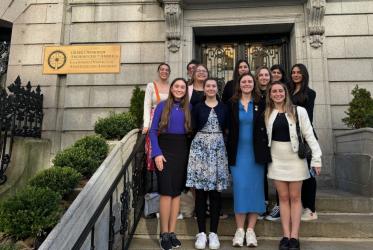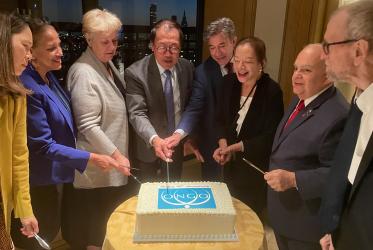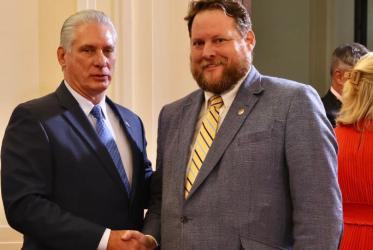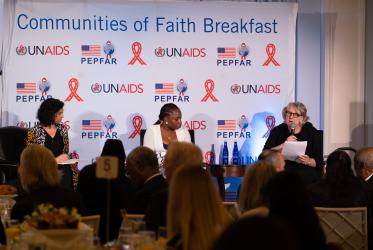How did you first come to work with United Methodist News?
Bloom: After attending journalism school at Ball State University, I held jobs at newspapers in Indiana. In 1988, I saw an ad in “Editor and Publisher” for a job with United Methodist News Service and its parent agency, United Methodist Communications. When I got the offer, I left the South Bend Tribune newspaper to move to New York City, where the job was based and where I’ve lived ever since.
What kind of computer did you use when you first started out?
Bloom: It feels like the Stone Age—even though it wasn’t! Remember the computers that had the blinking cursor? That’s what I used for my newspaper jobs. When I arrived in New York, I had a TRS-80 microcomputer—it was from the store RadioShack.
You attended the WCC Assembly in Canberra, Australia, in 1991, reporting for UM News. What you do remember about working at that assembly?
Bloom: At that time, ECUNET, an ecumenical computer network, was being used at the WCC Assembly. To file my stories, I had to transfer the stories via a cable to the computer of the ECUNET operator at the assembly. Then he would transmit the story through a phone line to the US. I was so appreciative; I remember bringing him a piece of fruit or cake whenever I needed to send a story!
How has the speed of technology changed your storytelling capability?
Bloom: We have the same pressures as secular journalists have to get stories out very quickly now. When I first started at UM News, we mailed our stories out via the US Postal Service, mostly to United Methodist churches and Annual Conferences in the US. At a certain point, I realized I’m not a print journalist anymore—I’m a web-based journalist. We have no publication; in fact, we describe ourselves as the Associated Press of the United Methodist Church.
In what ways did you use WCC News to help with your coverage?
Bloom: I used WCC News in several different ways: as general information on the WCC and the ecumenical movement; as a provider of ecumenical story ideas that UM News could adapt for its own stories and as occasional items in our Daily Digest with a direct link to WCC News. We also have used photos supplied by the WCC for our own stories on a WCC event or topic.
Did your coverage become more ecumenical over the years?
Bloom: I think it has become more ecumenical, though we always have tried to have ecumenical and interfaith coverage. We’ve also been able to expand our global coverage. One of the things in particular, over the past couple of decades, is that we developed more United Methodist correspondents from other regions, in Africa, the Philippines, and Europe in particular. One of my last stories for UM News was an overview on the global migration issue in Europe, and it was written largely through European connections as well as WCC connections.
Looking back, which stories do you regard as the most meaningful?
Bloom: I certainly don’t remember them all! One of the opportunities I had for reporting was to go with a United Methodist delegation to Indonesia soon after the tsunami that occurred at the end of 2004. Mike DuBose, our UM News photographer, was the other half of our reporting team. One of the people we interviewed and that we featured in the stories was a Methodist pastor in Banda Aceh. He was cleaning the debris around his church, which was a mess. Somehow, he had survived the tsunami by holding onto a palm tree for dear life. His wife and two-day-old daughter survived because they were on the third floor of the church, where the Sunday School rooms were. About 50 members of his church did not survive.
What will you miss the most?
Bloom: UM News has always had great staff. Just about everyone has secular news experience. Sometimes you have to tell people, "I am not the public relations person for this church!” We take our mandate—which is in the United Methodist Book of Discipline—to provide the news of the church very seriously, especially so during the COVID-19 pandemic. I didn’t really have much time to worry about my own isolation because we were working just as hard as ever getting out stories about the church. In a way, I hate to retire but several of my colleagues have also decided to do so. Things change. It’s not going to be the same.






